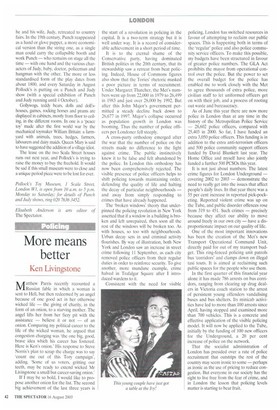More means better
Ken Livingstone
Matthew Parris recently recounted a Russian fable in which a woman is sent to Hell, but then redeemed by an angel because of one good act in her otherwise wicked life — the giving of charity, in the form of an onion, to a starving mother. The angel lifts her from her fiery pit with the
assistance believe it or not — of an onion. Comparing my political career to the life of the wicked woman, he argued that congestion charging was 'the one big, good, brave idea which his career has fostered. Here is Ken's onion.' His response to Steve Norris's plan to scrap the charge was to say 'count me out of this Tory campaign', adding, 'Some of us voters, gritting our teeth, may be ready to extend wicked Mr Livingstone a small but career-saving onion.'
If I may be so bold, I would like to propose another onion for the list. The second big achievement of the last three years is the start of a revolution in policing in the capital. It is a two-term strategy but it is well under way. It is a record of considerable achievement in a short period of time.
It is to the eternal shame of the Conservative party, having dominated British politics in the 20th century, that its stewardship saw a retreat from beat policing. Indeed, House of Commons figures also show that the Tories' rhetoric masked a poor picture in terms of recruitment. Under Margaret Thatcher, the Met's numbers went up from 22,000 in 1979 to 26,499 in 1983 and just over 28,000 by 1992. But after this John Major's government permitted a steady decline back down to 26,677 in 1997. Major's collapse occurred as population growth in London was booming. Thus the number of police officers per Londoner fell steeply.
A cross-party orthodoxy emerged after the war that the number of police on the streets made no difference to the fight against crime. The public instinctively knew it to be false and felt abandoned by the police. In London this orthodoxy has now been comprehensively rejected. The visible presence of police officers helps to shift policing towards maintaining order, defending the quality of life and halting the decay of particular neighbourhoods — and away from simply responding to crimes that have already happened.
The 'broken windows' theory that underpinned the policing revolution in New York asserted that if a window in a building is broken and left unrepaired, then soon all the rest of the windows will be broken too. As with houses, so too with neighbourhoods. Urban decay sets in and criminal activity flourishes. By way of illustration, both New York and London saw an increase in street crime following 11 September, as each city removed police officers from their regular duties in order to reinforce security. To give another, more mundane example, crime halved in Trafalgar Square after I introduced wardens to it.
Consistent with the need for visible policing, London has switched resources in favour of attempting to reclaim our public spaces. This is happening both in terms of the 'regular' police and also police community service officers. To make this possible, my budgets have been structured in favour of greater police numbers. The GLA Act prohibits the mayor from operational control over the police. But the power to set the overall budget for the police has enabled me to work closely with the Met to agree thousands of extra police, more civilian staff to let uniformed officers get on with their job, and a process of rooting out waste and bureaucracy.
As of June this year there are now more police in London than at any time in the history of the Metropolitan Police Service — 28,602 police officers, compared with 25,403 in 2000. So far, I have funded an extra 3,050 police officers. This funding is in addition to the extra anti-terrorism officers and 500 police community support officers funded by David Blunkett last year. The Home Office and myself have also jointly funded a further 500 PCSOs this year.
It is not just about numbers. The latest crime figures for London Underground — covering 2002 to 2003 — demonstrate the need to really get into the issues that affect people's daily lives. In that year there was a 55 per cent increase in reported pick-pocketing. Reported violent crime was up on the Tube, and public disorder offences rose from 319 to 451. Such crimes — precisely because they affect our ability to move around freely in our own city — have a disproportionate impact on our quality of life.
One of the most important innovations has been the creation of the Met's new Transport Operational Command Unit, directly paid for out of my transport budget. This ring-fenced policing unit patrols bus 'corridors' and clamps down on illegal taxi touts. It is aimed at reclaiming such public spaces for the people who use them.
In the first quarter of this financial year alone it has made 786 arrests On bus corridors, ranging from clearing up drug dealers in Victoria coach station to the arrest of persistent young offenders vandalising buses and bus shelters. Its minicab activities have led to more than 100 arrests since April, having stopped and examined more than 700 vehicles. This is a concrete and effective application of the visible policing model. It will now be applied to the Tube, initially by the funding of 100 new officers for the Underground, a 20 per cent increase of police on the network.
That the socialist administration of London has presided over a rate of police recruitment that outstrips the rest of the country may seem ironic to some — perhaps as ironic as the use of pricing to reduce congestion. But everyone in our society has the right to live free from the fear of crime, and in London the lesson that policing levels matter is starting to bear fruit.










































































 Previous page
Previous page